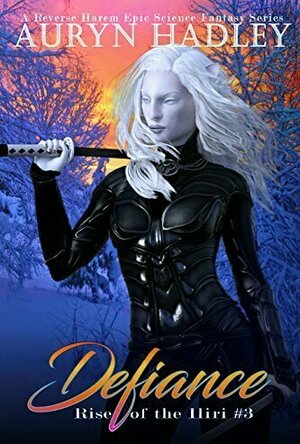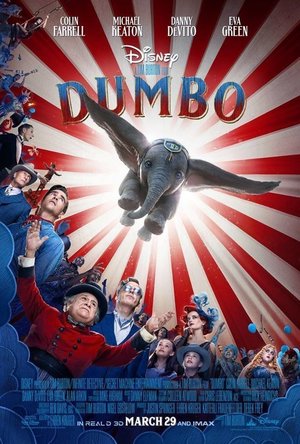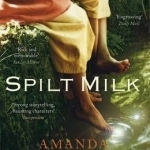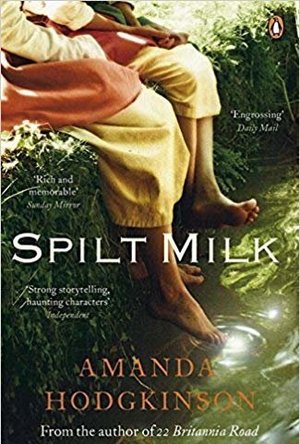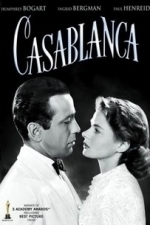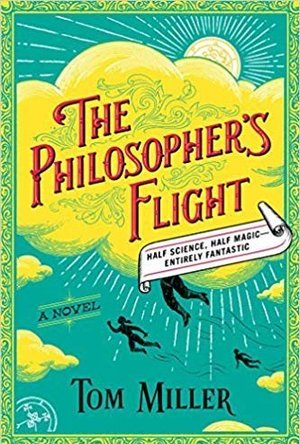Search
Search results

Mordheim: Warband Skirmish
Games
App
Explore the ruins of the City of Mordheim, clash with other scavenging warbands and collect...
Lyndsey Gollogly (2893 KP) rated Defiance (Rise of the Iliri #3) in Books
Mar 3, 2020
Contains spoilers, click to show
HER ONLY CHOICE IS TO CHANGE HER WORLD…
Salryc Luxx has come a long way in just four years, from slave to conscript, to elite Black Blade assassin, rising rapidly as her extraordinary abilities are revealed. Promoted to lieutenant after capturing a valuable shipment of metals and laying waste to the invading force, she and Cyno, her partner (in war and love), have been entrusted with a dangerous mission: to assassinate the King of Anglia and the five nobles in line for the throne, leaving the path to ascension clear for their own leader.
That’s one side of the story. The other is that she and Cyno have been assigned this suicide mission as Parliament’s first pass at removing the iliri taint from the military. Either way, without the strength of allies, the Conglomerate of Free Citizens cannot turn back the invaders, whose goal is to wipe out the whole iliri species, so Sal and Cyno are the only hope of ending the continental war devastating their species. Traveling for months, they are so far away from their home base that they’re beyond the mental link that connects the pack. They remain committed to their mission—and to each other, but… unhappily disturbed. They can only hope their separation from the pack bring them closer together. But the danger is, in the absence of the pack, their bond will wither.
A kind deed, helping what they take to be a wounded animal, leads to the discovery of their true nature, to strengthening and re-energizing their pack, and to a surprising alliance that offers hope for the future. The wounded animal, they learn, is a graour wolf, a species of ferocious warriors with language and traits nearly identical to iliri. When two of them ask to join her pack, Sal recruits them as Black Blades and the iliri are no longer the only dog in the fight for iliri freedom.
But Anglia is nothing like the Conglomerate of Free Citizens. Anglians discriminate based on gender, not species. Iliri are thought to be just a myth--until Sal shows her face. To convince the king and his council that yes, a woman really can be a soldier, she's going to have to make her own rules. The enemy is moving. She doesn't have time to deal with outdated court manners.
As the defiance of an entire species rises up in her, she really has no choice—she’ll just have to change the world.
Women readers will thrill to the reverse harem idea that pushes the boundaries of epic fantasy in this second world series that may remind some of Avatar without the scary beasts; or even Game Of Thrones, but happier, with more color—and a dazzling female protagonist. Fans of Anne McCaffrey’s Dragonriders of Pern will find Sal’s planet Ogun a thrilling destination for their next fantasy fix
They just keep getting better! Sal and Cyno are out on their own and they are kicking up a storm! We get to meet the Graour who the Iliri are descended from! We get a chance to see a whole new world building. I love the new characters and you are with them every step of the way on the battlefield it's also such a good feeling when the black blades are all back together and loving their new pack mates. It was only a matter of time before Cyno became her number 1 I'm glad Blaec took it well. Looking forward to book 4!
Salryc Luxx has come a long way in just four years, from slave to conscript, to elite Black Blade assassin, rising rapidly as her extraordinary abilities are revealed. Promoted to lieutenant after capturing a valuable shipment of metals and laying waste to the invading force, she and Cyno, her partner (in war and love), have been entrusted with a dangerous mission: to assassinate the King of Anglia and the five nobles in line for the throne, leaving the path to ascension clear for their own leader.
That’s one side of the story. The other is that she and Cyno have been assigned this suicide mission as Parliament’s first pass at removing the iliri taint from the military. Either way, without the strength of allies, the Conglomerate of Free Citizens cannot turn back the invaders, whose goal is to wipe out the whole iliri species, so Sal and Cyno are the only hope of ending the continental war devastating their species. Traveling for months, they are so far away from their home base that they’re beyond the mental link that connects the pack. They remain committed to their mission—and to each other, but… unhappily disturbed. They can only hope their separation from the pack bring them closer together. But the danger is, in the absence of the pack, their bond will wither.
A kind deed, helping what they take to be a wounded animal, leads to the discovery of their true nature, to strengthening and re-energizing their pack, and to a surprising alliance that offers hope for the future. The wounded animal, they learn, is a graour wolf, a species of ferocious warriors with language and traits nearly identical to iliri. When two of them ask to join her pack, Sal recruits them as Black Blades and the iliri are no longer the only dog in the fight for iliri freedom.
But Anglia is nothing like the Conglomerate of Free Citizens. Anglians discriminate based on gender, not species. Iliri are thought to be just a myth--until Sal shows her face. To convince the king and his council that yes, a woman really can be a soldier, she's going to have to make her own rules. The enemy is moving. She doesn't have time to deal with outdated court manners.
As the defiance of an entire species rises up in her, she really has no choice—she’ll just have to change the world.
Women readers will thrill to the reverse harem idea that pushes the boundaries of epic fantasy in this second world series that may remind some of Avatar without the scary beasts; or even Game Of Thrones, but happier, with more color—and a dazzling female protagonist. Fans of Anne McCaffrey’s Dragonriders of Pern will find Sal’s planet Ogun a thrilling destination for their next fantasy fix
They just keep getting better! Sal and Cyno are out on their own and they are kicking up a storm! We get to meet the Graour who the Iliri are descended from! We get a chance to see a whole new world building. I love the new characters and you are with them every step of the way on the battlefield it's also such a good feeling when the black blades are all back together and loving their new pack mates. It was only a matter of time before Cyno became her number 1 I'm glad Blaec took it well. Looking forward to book 4!
Darren (1599 KP) rated Dumbo (2019) in Movies
Nov 30, 2019
Verdict: Charming
Story: Dumbo starts when Holt Farrier (Farrell) returns from war, to re-join the circus run by Max Medici (DeVito) where his kids Milly (Parker) and Joe (Hobbins) have been living and working for years, Holt has come back injured, with the only job offered to him, being cleaning up after the elephants, one of which is pregnant giving birth to an elephant with giant ears, which only causes chaos on his debut in the circus.
After Dumbo’s mother is taken away, he is left alone, while the children learn about his flying skills, which turns Max’s circus into the talk of the country, attracting V. A. Vandevere (Keaton) who wants to offer Max the world for Dumbo.
Thoughts on Dumbo
Characters – Holt Farrier is a war veteran widow that has returned to his children in a circus. He has been suffering with his time away, this has seen him not show as much affection as his wife would have, he takes the only job he can get which sees him training and cleaning up the elephants, his time back in the circus does bring him back to his kids, where he learns how important life still can be. V. A. Vandevere is the operator of Dreamland, he sales the idea of a better life for the whole troop, even if he has his own ideas to just make himself rich. Max Medici runs the small circus that discovers Dumbo’s talent, he has always been in the game for the money and can’t resist the idea of money when Vandevere arrives but must learn there is more to his life than money. Colette Marchant is the star performer in Vandevere show, she has been for years though she is just the hottest thing he has going for a while, she doe solve to perform. Dumbo is the baby elephant with giant eyes, who loses his mother, but has the incredible ability to fly, drawing crowds from miles.
Performances – Colin Farrell gives us a wonderful performance as the caring veteran who has been struggling with his own problems once returning from war. Michael Keaton enjoy the villainous role, while Danny DeVito is shows the desperation while still bringing the heart needing for the role, Eva Green shines to as the beautiful performer too.
Story – The story here shows how a small circus that finds themselves with a star attraction in Dumbo, which sees them become a success that the whole country wants to see. The story might focus on Dumbo being forced into performing after having his mother taken away, while deeper down we get to see a family that has been broken from death and war, needing to come back together. We see themes of greed with the circus masters at times, but all together the ideas behind everything all shine through to show that people who do good will get what they deserve in life.
Adventure/Fantasy – The adventure shows the how Dumbo comes into the world and put through traumas at a young age before finding his feet and learn that some people are good in life, with the fantasy of an elephant that can fly being the highlight of what makes Dumbo so special.
Settings – The film uses the settings to show the different sizes of circus that we see Dumbo being part of.
Special Effects – The effects in the film are brilliant bringing Dumbo to life like nothing we could have imagined.
Scene of the Movie – The Dumbo flight.
That Moment That Annoyed Me – It does spend too much time telling Milly she can’t follow her scientist dreams.
Final Thoughts – This is the best live action Disney film of 2019, it brings the scale of the idea to life, which looks wonderful and has great performances too.
Overall: Beautiful Fantasy Film.
Story: Dumbo starts when Holt Farrier (Farrell) returns from war, to re-join the circus run by Max Medici (DeVito) where his kids Milly (Parker) and Joe (Hobbins) have been living and working for years, Holt has come back injured, with the only job offered to him, being cleaning up after the elephants, one of which is pregnant giving birth to an elephant with giant ears, which only causes chaos on his debut in the circus.
After Dumbo’s mother is taken away, he is left alone, while the children learn about his flying skills, which turns Max’s circus into the talk of the country, attracting V. A. Vandevere (Keaton) who wants to offer Max the world for Dumbo.
Thoughts on Dumbo
Characters – Holt Farrier is a war veteran widow that has returned to his children in a circus. He has been suffering with his time away, this has seen him not show as much affection as his wife would have, he takes the only job he can get which sees him training and cleaning up the elephants, his time back in the circus does bring him back to his kids, where he learns how important life still can be. V. A. Vandevere is the operator of Dreamland, he sales the idea of a better life for the whole troop, even if he has his own ideas to just make himself rich. Max Medici runs the small circus that discovers Dumbo’s talent, he has always been in the game for the money and can’t resist the idea of money when Vandevere arrives but must learn there is more to his life than money. Colette Marchant is the star performer in Vandevere show, she has been for years though she is just the hottest thing he has going for a while, she doe solve to perform. Dumbo is the baby elephant with giant eyes, who loses his mother, but has the incredible ability to fly, drawing crowds from miles.
Performances – Colin Farrell gives us a wonderful performance as the caring veteran who has been struggling with his own problems once returning from war. Michael Keaton enjoy the villainous role, while Danny DeVito is shows the desperation while still bringing the heart needing for the role, Eva Green shines to as the beautiful performer too.
Story – The story here shows how a small circus that finds themselves with a star attraction in Dumbo, which sees them become a success that the whole country wants to see. The story might focus on Dumbo being forced into performing after having his mother taken away, while deeper down we get to see a family that has been broken from death and war, needing to come back together. We see themes of greed with the circus masters at times, but all together the ideas behind everything all shine through to show that people who do good will get what they deserve in life.
Adventure/Fantasy – The adventure shows the how Dumbo comes into the world and put through traumas at a young age before finding his feet and learn that some people are good in life, with the fantasy of an elephant that can fly being the highlight of what makes Dumbo so special.
Settings – The film uses the settings to show the different sizes of circus that we see Dumbo being part of.
Special Effects – The effects in the film are brilliant bringing Dumbo to life like nothing we could have imagined.
Scene of the Movie – The Dumbo flight.
That Moment That Annoyed Me – It does spend too much time telling Milly she can’t follow her scientist dreams.
Final Thoughts – This is the best live action Disney film of 2019, it brings the scale of the idea to life, which looks wonderful and has great performances too.
Overall: Beautiful Fantasy Film.
Hazel (1853 KP) rated Spilt Milk in Books
May 30, 2017
Not about milk
I received this book for free through Goodreads First Reads.
Spilt Milk is the second historical novel by Amanda Hodgkinson, award-winning British author of 22 Britannia Road. Split into two parts it follows the lives of two sisters over several decades during the first half of the twentieth century. Set in Britain, this is a novel about relationships, family, secrets… and illegitimate pregnancies. Lots of illegitimate pregnancies.
The first part spans from 1913 until 1917 thus covering the First World War period. The second part picks up the storyline in 1939 and continues until the novel’s final pages set in 1965. So yet another world war is included, although it has little impact on the plot. The first chapter is almost like the calm before the storm. Everything appears peaceful and happy until everything spirals out of control. Vivian and Nellie Marsh (aged twenty three and twenty two) have been raised by their older sister Rose in a small farmhouse since the death of their parents when Nellie was a baby. We first meet Nellie rinsing chamber pots outside where she has a feeling that something is going to happen; something good, she hopes. Alas, it turns out it was a bad feeling after all as floodwaters rise and Rose dies. The only apparent good thing is the arrival of a hired farm hand, Joe Ferier. But no, that is also a bad occurrence that leaves one sister pregnant and the other temporarily homeless.
Over the years we see how the sisters deal with the way in which their lives have drastically changed up until Nellie has a child with her husbands brother. Luckily her husband is willing to pass the child off as his own, and so Nellie, unlike the other secret pregnancies in this story, actually gets to keep her love child.
At the start of part two, Nellie’s daughter Bertha (commonly known as Birdie) is eighteen years old and finds herself – can you guess? – pregnant after a one night stand. So that it can remain secret she goes to live with her Aunt Vivian until the baby is born and adopted. Vivian ends up housing many girls including a couple of minor characters who have got themselves in a similar way. I did say there were a lot of illegitimate pregnancies! It also comes to light that supposedly innocent, spinster Rose had not one but two babies during her teenage years.
The remainder of the novel shows us how the girls: Nellie, Vivian and Birdie; get on with their lives under the burden of their personal secrets and emotions. It is Birdie who struggles the most with the knowledge that her daughter is growing up without her but to talk to anyone about it would have deep consequences.
The size of the time period means that the reader can become attached to certain key characters and feel their pain as they struggle with their emotional afflictions, however each scene passes quickly as time goes on which means we do not really get to appreciate the minor characters.
Overall it is a good, reasonably quick read which many women would enjoy, particularly those who appreciate historical fiction and may have sisters of their own and therefore understand what the power of keeping secrets can result in.
Spilt Milk is the second historical novel by Amanda Hodgkinson, award-winning British author of 22 Britannia Road. Split into two parts it follows the lives of two sisters over several decades during the first half of the twentieth century. Set in Britain, this is a novel about relationships, family, secrets… and illegitimate pregnancies. Lots of illegitimate pregnancies.
The first part spans from 1913 until 1917 thus covering the First World War period. The second part picks up the storyline in 1939 and continues until the novel’s final pages set in 1965. So yet another world war is included, although it has little impact on the plot. The first chapter is almost like the calm before the storm. Everything appears peaceful and happy until everything spirals out of control. Vivian and Nellie Marsh (aged twenty three and twenty two) have been raised by their older sister Rose in a small farmhouse since the death of their parents when Nellie was a baby. We first meet Nellie rinsing chamber pots outside where she has a feeling that something is going to happen; something good, she hopes. Alas, it turns out it was a bad feeling after all as floodwaters rise and Rose dies. The only apparent good thing is the arrival of a hired farm hand, Joe Ferier. But no, that is also a bad occurrence that leaves one sister pregnant and the other temporarily homeless.
Over the years we see how the sisters deal with the way in which their lives have drastically changed up until Nellie has a child with her husbands brother. Luckily her husband is willing to pass the child off as his own, and so Nellie, unlike the other secret pregnancies in this story, actually gets to keep her love child.
At the start of part two, Nellie’s daughter Bertha (commonly known as Birdie) is eighteen years old and finds herself – can you guess? – pregnant after a one night stand. So that it can remain secret she goes to live with her Aunt Vivian until the baby is born and adopted. Vivian ends up housing many girls including a couple of minor characters who have got themselves in a similar way. I did say there were a lot of illegitimate pregnancies! It also comes to light that supposedly innocent, spinster Rose had not one but two babies during her teenage years.
The remainder of the novel shows us how the girls: Nellie, Vivian and Birdie; get on with their lives under the burden of their personal secrets and emotions. It is Birdie who struggles the most with the knowledge that her daughter is growing up without her but to talk to anyone about it would have deep consequences.
The size of the time period means that the reader can become attached to certain key characters and feel their pain as they struggle with their emotional afflictions, however each scene passes quickly as time goes on which means we do not really get to appreciate the minor characters.
Overall it is a good, reasonably quick read which many women would enjoy, particularly those who appreciate historical fiction and may have sisters of their own and therefore understand what the power of keeping secrets can result in.
Hazel (1853 KP) rated Spilt Milk in Books
Dec 14, 2018
<i>I received this book for free through Goodreads First Reads.</i>
<i>Spilt Milk</i> is the second historical novel by Amanda Hodgkinson, award-winning British author of <i>22 Britannia Road</i>. Split into two parts it follows the lives of two sisters over several decades during the first half of the twentieth century. Set in Britain, this is a novel about relationships, family, secrets… and illegitimate pregnancies. Lots of illegitimate pregnancies.
The first part spans from 1913 until 1917 thus covering the First World War period. The second part picks up the storyline in 1939 and continues until the novel’s final pages set in 1965. So yet another world war is included, although it has little impact on the plot. The first chapter is almost like the calm before the storm. Everything appears peaceful and happy until everything spirals out of control. Vivian and Nellie Marsh (aged twenty three and twenty two) have been raised by their older sister Rose in a small farmhouse since the death of their parents when Nellie was a baby. We first meet Nellie rinsing chamber pots outside where she has a feeling that something is going to happen; something good, she hopes. Alas, it turns out it was a bad feeling after all as floodwaters rise and Rose dies. The only apparent good thing is the arrival of a hired farm hand, Joe Ferier. But no, that is also a bad occurrence that leaves one sister pregnant and the other temporarily homeless.
Over the years we see how the sisters deal with the way in which their lives have drastically changed up until Nellie has a child with her husbands brother. Luckily her husband is willing to pass the child off as his own, and so Nellie, unlike the other secret pregnancies in this story, actually gets to keep her love child.
At the start of part two, Nellie’s daughter Bertha (commonly known as Birdie) is eighteen years old and finds herself – can you guess? – pregnant after a one night stand. So that it can remain secret she goes to live with her Aunt Vivian until the baby is born and adopted. Vivian ends up housing many girls including a couple of minor characters who have got themselves in a similar way. I did say there were a lot of illegitimate pregnancies! It also comes to light that supposedly innocent, spinster Rose had not one but two babies during her teenage years.
The remainder of the novel shows us how the girls: Nellie, Vivian and Birdie; get on with their lives under the burden of their personal secrets and emotions. It is Birdie who struggles the most with the knowledge that her daughter is growing up without her but to talk to anyone about it would have deep consequences.
The size of the time period means that the reader can become attached to certain key characters and feel their pain as they struggle with their emotional afflictions, however each scene passes quickly as time goes on which means we do not really get to appreciate the minor characters.
Overall it is a good, reasonably quick read which many women would enjoy, particularly those who appreciate historical fiction and may have sisters of their own and therefore understand what the power of keeping secrets can result in.
<i>Spilt Milk</i> is the second historical novel by Amanda Hodgkinson, award-winning British author of <i>22 Britannia Road</i>. Split into two parts it follows the lives of two sisters over several decades during the first half of the twentieth century. Set in Britain, this is a novel about relationships, family, secrets… and illegitimate pregnancies. Lots of illegitimate pregnancies.
The first part spans from 1913 until 1917 thus covering the First World War period. The second part picks up the storyline in 1939 and continues until the novel’s final pages set in 1965. So yet another world war is included, although it has little impact on the plot. The first chapter is almost like the calm before the storm. Everything appears peaceful and happy until everything spirals out of control. Vivian and Nellie Marsh (aged twenty three and twenty two) have been raised by their older sister Rose in a small farmhouse since the death of their parents when Nellie was a baby. We first meet Nellie rinsing chamber pots outside where she has a feeling that something is going to happen; something good, she hopes. Alas, it turns out it was a bad feeling after all as floodwaters rise and Rose dies. The only apparent good thing is the arrival of a hired farm hand, Joe Ferier. But no, that is also a bad occurrence that leaves one sister pregnant and the other temporarily homeless.
Over the years we see how the sisters deal with the way in which their lives have drastically changed up until Nellie has a child with her husbands brother. Luckily her husband is willing to pass the child off as his own, and so Nellie, unlike the other secret pregnancies in this story, actually gets to keep her love child.
At the start of part two, Nellie’s daughter Bertha (commonly known as Birdie) is eighteen years old and finds herself – can you guess? – pregnant after a one night stand. So that it can remain secret she goes to live with her Aunt Vivian until the baby is born and adopted. Vivian ends up housing many girls including a couple of minor characters who have got themselves in a similar way. I did say there were a lot of illegitimate pregnancies! It also comes to light that supposedly innocent, spinster Rose had not one but two babies during her teenage years.
The remainder of the novel shows us how the girls: Nellie, Vivian and Birdie; get on with their lives under the burden of their personal secrets and emotions. It is Birdie who struggles the most with the knowledge that her daughter is growing up without her but to talk to anyone about it would have deep consequences.
The size of the time period means that the reader can become attached to certain key characters and feel their pain as they struggle with their emotional afflictions, however each scene passes quickly as time goes on which means we do not really get to appreciate the minor characters.
Overall it is a good, reasonably quick read which many women would enjoy, particularly those who appreciate historical fiction and may have sisters of their own and therefore understand what the power of keeping secrets can result in.
DaveySmithy (107 KP) rated Casablanca (1942) in Movies
Dec 3, 2024
A Timeless Classic: Casablanca - A 10/10 Masterpiece
Few films manage to withstand the test of time quite like Casablanca. Released in 1942, this cinematic gem not only defines its era but also transcends it, continuing to captivate audiences decades later. Directed by Michael Curtiz and featuring unforgettable performances by Humphrey Bogart and Ingrid Bergman, Casablanca is a rare film that combines stellar storytelling, iconic performances, and a profound emotional core into an unparalleled movie experience.
What makes Casablanca truly extraordinary is its perfect balance of intimate romance and global stakes. Set during World War II in the Moroccan city of Casablanca, the story revolves around Rick Blaine (Bogart), a cynical American expatriate who runs a nightclub, and Ilsa Lund (Bergman), the woman who once broke his heart. Their unexpected reunion is fraught with unresolved emotions and set against the backdrop of political intrigue, resistance efforts, and the shadow of Nazi oppression. It’s not just a love story—it’s a story of sacrifice, morality, and the search for meaning in chaotic times.
Humphrey Bogart, known for his tough-guy persona, delivers a nuanced and deeply human performance as Rick. His dry wit, vulnerability, and quiet heroism make Rick one of cinema’s most iconic characters. Bogart effortlessly conveys the tension between Rick’s outward indifference and his inner turmoil, making his journey from apathy to sacrifice profoundly moving. Opposite him, Ingrid Bergman is luminous as Ilsa. Her portrayal is layered with strength, grace, and a quiet sadness that makes her character unforgettable. The chemistry between Bogart and Bergman is electric, their unspoken longing resonating in every glance and line of dialogue.
The supporting cast is equally brilliant. Claude Rains as the charmingly corrupt Captain Renault steals nearly every scene he’s in with his biting humor and moral ambiguity. Paul Henreid’s portrayal of Victor Laszlo, the noble resistance leader, adds gravitas to the story, while Sydney Greenstreet and Peter Lorre deliver memorable turns as colorful figures in Casablanca’s shadowy underworld. Every character, no matter how small their role, feels fully realized and essential to the tapestry of the story.
What elevates Casablanca to legendary status, however, is its script. Few films boast dialogue as sharp and iconic, with lines like “Here’s looking at you, kid,” and “We’ll always have Paris” becoming ingrained in pop culture. The screenplay, penned by Julius and Philip Epstein and Howard Koch, is a masterclass in storytelling, seamlessly blending romance, suspense, and humor. Each scene serves a purpose, driving the plot forward while deepening the emotional stakes.
Max Steiner’s score is another standout element, with the recurring use of “As Time Goes By” becoming as timeless as the film itself. The music weaves through the narrative, underscoring moments of joy, heartbreak, and tension with haunting beauty.
But perhaps the most remarkable aspect of Casablanca is its ability to resonate on multiple levels. It’s a sweeping romance, a gripping war drama, and a meditation on sacrifice and duty, all rolled into one. Its themes remain universal, its characters relatable, and its emotional impact undiminished by time.
In a world filled with good movies and great movies, Casablanca stands apart as a perfect one. It’s not just a film—it’s an experience, a masterpiece that speaks to the heart and soul. For that, it earns a well-deserved 10/10.
What makes Casablanca truly extraordinary is its perfect balance of intimate romance and global stakes. Set during World War II in the Moroccan city of Casablanca, the story revolves around Rick Blaine (Bogart), a cynical American expatriate who runs a nightclub, and Ilsa Lund (Bergman), the woman who once broke his heart. Their unexpected reunion is fraught with unresolved emotions and set against the backdrop of political intrigue, resistance efforts, and the shadow of Nazi oppression. It’s not just a love story—it’s a story of sacrifice, morality, and the search for meaning in chaotic times.
Humphrey Bogart, known for his tough-guy persona, delivers a nuanced and deeply human performance as Rick. His dry wit, vulnerability, and quiet heroism make Rick one of cinema’s most iconic characters. Bogart effortlessly conveys the tension between Rick’s outward indifference and his inner turmoil, making his journey from apathy to sacrifice profoundly moving. Opposite him, Ingrid Bergman is luminous as Ilsa. Her portrayal is layered with strength, grace, and a quiet sadness that makes her character unforgettable. The chemistry between Bogart and Bergman is electric, their unspoken longing resonating in every glance and line of dialogue.
The supporting cast is equally brilliant. Claude Rains as the charmingly corrupt Captain Renault steals nearly every scene he’s in with his biting humor and moral ambiguity. Paul Henreid’s portrayal of Victor Laszlo, the noble resistance leader, adds gravitas to the story, while Sydney Greenstreet and Peter Lorre deliver memorable turns as colorful figures in Casablanca’s shadowy underworld. Every character, no matter how small their role, feels fully realized and essential to the tapestry of the story.
What elevates Casablanca to legendary status, however, is its script. Few films boast dialogue as sharp and iconic, with lines like “Here’s looking at you, kid,” and “We’ll always have Paris” becoming ingrained in pop culture. The screenplay, penned by Julius and Philip Epstein and Howard Koch, is a masterclass in storytelling, seamlessly blending romance, suspense, and humor. Each scene serves a purpose, driving the plot forward while deepening the emotional stakes.
Max Steiner’s score is another standout element, with the recurring use of “As Time Goes By” becoming as timeless as the film itself. The music weaves through the narrative, underscoring moments of joy, heartbreak, and tension with haunting beauty.
But perhaps the most remarkable aspect of Casablanca is its ability to resonate on multiple levels. It’s a sweeping romance, a gripping war drama, and a meditation on sacrifice and duty, all rolled into one. Its themes remain universal, its characters relatable, and its emotional impact undiminished by time.
In a world filled with good movies and great movies, Casablanca stands apart as a perfect one. It’s not just a film—it’s an experience, a masterpiece that speaks to the heart and soul. For that, it earns a well-deserved 10/10.
Bookapotamus (289 KP) rated The Philosopher's Flight in Books
May 29, 2018
For anyone who has been suffering withdrawal from the end of a certain magical boy wizard series, The Philosopher's Flight by Tom Miller is the perfect antidote! It's clever, and sharp, but also a quick read based on alternative history where special "powers" can do different things, and one boys journey to"fit in" this world where girls rule! The opposite sexism is interesting (women typically have the most refined powers and go to war, do the dangerous stuff, etc.) and Robert wants to do everything the women do - and we see if he attains that goal, while facing some pretty crazy "roadblocks" along the way.
I love stories that take me away to another place - get me out of reality and imagine what life would be like if things were "different". And this book does just that. It's very clever how it's pretty historically accurate, just with this twist of Sigilry, these signs and symbols drawn to move energy and ultimately produce some sort of effect (hovering/flying, restoring health, moving an object, sending messages). There are great stories of friendship, interesting characters, and stories of love as well. All wrapped up in a creative story of action, adventure and social-awareness.
There are a few "racy" scenes...so I'd recommend a more mature audience, but its fantastic all-around in general. I'm excited to see if the Philosopher Flies Again! Thanks NetGalley!
I love stories that take me away to another place - get me out of reality and imagine what life would be like if things were "different". And this book does just that. It's very clever how it's pretty historically accurate, just with this twist of Sigilry, these signs and symbols drawn to move energy and ultimately produce some sort of effect (hovering/flying, restoring health, moving an object, sending messages). There are great stories of friendship, interesting characters, and stories of love as well. All wrapped up in a creative story of action, adventure and social-awareness.
There are a few "racy" scenes...so I'd recommend a more mature audience, but its fantastic all-around in general. I'm excited to see if the Philosopher Flies Again! Thanks NetGalley!
David McK (3663 KP) rated Chaosmage (The Age of Darkness Trilogy, #3) in Books
Jan 30, 2019
The final part of [a:Stephen Aryan|10372063|Stephen Aryan|https://images.gr-assets.com/authors/1435501696p2/10372063.jpg]'s 'Age of Darkness' trilogy (that also consists of [b:Battlemage|24396857|Battlemage (The Age of Darkness Trilogy, #1)|Stephen Aryan|https://images.gr-assets.com/books/1434726211s/24396857.jpg|43981438] and [b:Bloodmage|26030693|Bloodmage (The Age of Darkness Trilogy #2)|Stephen Aryan|https://images.gr-assets.com/books/1454627052s/26030693.jpg|46819958]), with this one having more-than-a-hint of 'The Walking Dead' about it, primarily set (as it is) in a compound in an eerily abandoned and destroyed city (after the war covered in [b:Battlemage|24396857|Battlemage (The Age of Darkness Trilogy, #1)|Stephen Aryan|https://images.gr-assets.com/books/1434726211s/24396857.jpg|43981438]) that is under siege by - more or less - zombies.
OK, maybe not zombies in the classicly - or comtemporarily (is that a word?) - understood sense, but that's more or less what 'The Forsaken' (as they are called) come across as.
This novel also sees the return of the Battlemage Balfruss - who seems to be modelled after [a:David Gemmell|11586|David Gemmell|https://images.gr-assets.com/authors/1202771023p2/11586.jpg]'s character of Druss, if Druss could use magic - with it taking more or less chapter about to move between his point of view and the other key characters.
All-inan-all a solid ending to the trilogy, that leaves the door open for further tales to be told in this world.
OK, maybe not zombies in the classicly - or comtemporarily (is that a word?) - understood sense, but that's more or less what 'The Forsaken' (as they are called) come across as.
This novel also sees the return of the Battlemage Balfruss - who seems to be modelled after [a:David Gemmell|11586|David Gemmell|https://images.gr-assets.com/authors/1202771023p2/11586.jpg]'s character of Druss, if Druss could use magic - with it taking more or less chapter about to move between his point of view and the other key characters.
All-inan-all a solid ending to the trilogy, that leaves the door open for further tales to be told in this world.

The Lost Airman: A True Story of Escape from Nazi-Occupied France
Book
Arthur Meyerowitz was on his second air mission over France when he was shot down in 1943. He was...
